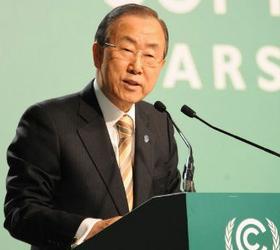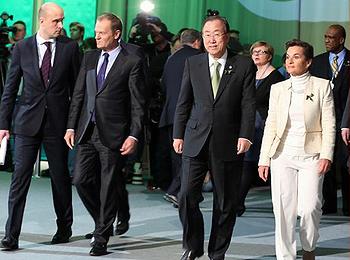New Global Climate Change Agreement by 2015.

WARSAW, Poland, November 20, 2013 (ENS) – UN Secretary-General Ban Ki-moon today called on government leaders to prioritize the environment in domestic politics and contribute to climate financing as a way of moving towards a new global climate change agreement by 2015.
“This can do more than anything to unlock the huge investment necessary for climate change adaptation and mitigation,” Ban told a ministerial-level meeting on the margins of the UN-led climate change negotiations underway in the Polish capital.
The high-level ministerial portion of the Warsaw talks opened Tuesday and will continue through the rest of the week, culminating in an outcome document scheduled to be agreed on November 22.
Today heads of government and ministers considered progress made in mobilizing long-term climate finance, including efforts by developed countries to scale up finance.
“We must send the right policy signals,” Ban said.
Ban said the development of high-impact opportunities would unlock clean energy investments, close the viability gap between green projects and fossil fuel projects and remove risk from renewable energy and low-carbon investments.
He called for public finance, private finance, and support to the Green Climate Fund as three areas for common action.
“Smart public financing can encourage local and international private investments,” said Ban, urging investors and companies to join forces with the public sector.
Ban today also met with chief executives and senior representatives attending the inaugural Caring for Climate Business Forum being held in Warsaw alongside the UN Climate Change Conference.
The Forum was launched by UN Global Compact, the secretariat of the UN Framework Convention on Climate Change, UNFCCC, and the UN Environment Programme.
“The bulk of institutional investors’ assets are in high carbon investments,” said Ban. “These investors have the power – and I believe the responsibility – to do their part in transforming the global economy and settling us on a safer path.”
Speaking in the plenary session, Ban called for support to the newly established Green Climate Fund, which functions within the framework of the UNFCCC. It is intended to be the focus of efforts to raise climate financing for developing countries of US$100 billion a year by 2020.
Based in the new Songdo district of Incheon, South Korea, the Green Climate Fund aims to enable countries to develop the capabilities and institutions needed to use climate finance effectively.
Ban described the current state of the new Green Climate Fund as “an empty shell” and called for it to be brought into full operation “as soon as possible” so support can flow to developing countries for their efforts to mitigate and adapt to climate change.
Hela Cheikhrouhou, who heads the new Green Climate Fund, said the fund is “getting ready to open for business.” The opening ceremony for the Fund’s headquarters is set for December 4 in Songdo.
Cheikhrouhou is director of the Energy, Environment and Climate Change Department of the African Development Bank. Speaking in Warsaw, she called on the Green Climate Fund’s 24-member Board of Directors to adopt the necessary decisions for it to begin operating. She asked developing countries to identify priorities that will enable them to make requests to the fund, and she called on developed countries to contribute to the fund and catalyze private sector contributions.
Delivering a keynote address, UK economist Nicholas Stern warned that “government-induced policy risk” is the biggest barrier to private investment. He called for increased support for the greening of development in poorer countries.
In the high-level discussion on climate finance today, COP19 President Marcin Korolec, Poland’s environment minister, urged called on governments to make progress in Warsaw on adaptation finance, predictability and mobilization from a broad range of financial sources.


